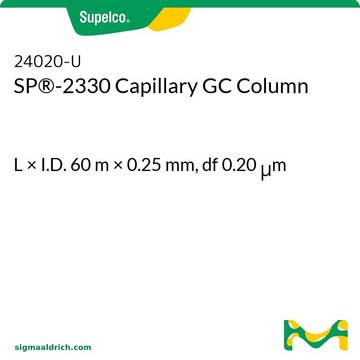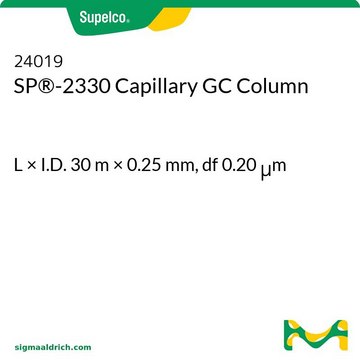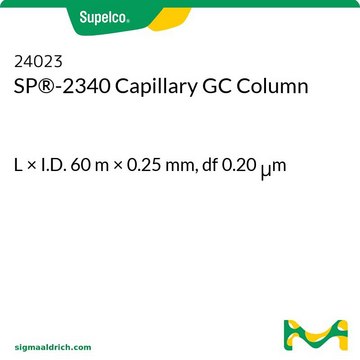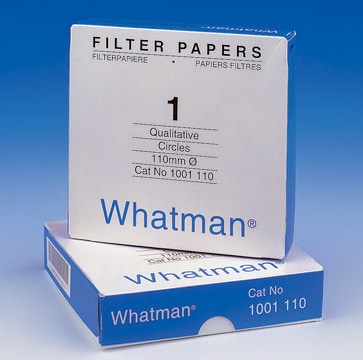24074
SP®-2330 Capillary GC Column
L × I.D. 60 m × 0.32 mm, df 0.20 μm
Sign Into View Organizational & Contract Pricing
All Photos(1)
About This Item
UNSPSC Code:
41115710
eCl@ss:
32119290
Recommended Products
material
fused silica
agency
meets requirements for USP G8
parameter
≤25-250 °C temperature (isothermal or programmed)
Beta value
400
df
0.20 μm
technique(s)
gas chromatography (GC): suitable
L × I.D.
60 m × 0.32 mm
matrix active group
Non-bonded; poly (80% biscyanopropyl/20% cyanopropylphenyl siloxane) phase
column type
capillary highly polar
Looking for similar products? Visit Product Comparison Guide
General description
Application: Supelco offers the broadest range of biscyanopropyl phases in the industry. This column is a highly specialized column that offers both polar and polarizable features due to the substitution of biscyanopropyl and phenyl groups onto the polymer backbone. It can be used for both high and low temperature separations for analytes such as geometric isomers of fatty acid methyl esters (FAMEs), dioxins, and aromatic compounds.
USP Code: This column meets USP G8 requirements.
Phase:
USP Code: This column meets USP G8 requirements.
Phase:
- Non-bonded
- Poly(80% biscyanopropyl/20% cyanopropylphenyl siloxane)
- Subambient to 250 °C (isothermal or programmed)
Capillary GC column is also known as open tubular column. The carrier gas flows through the central aperture and is unrestricted throughout the length of the column.
Application
Capillary column of SP®-2330 is suitable for being used in gas-liquid chromatograpgy (GLC), used for separation of partially methylated alditol acetates.
Other Notes
We offer a variety of chromatography accessories including analytical syringes
Legal Information
SP is a registered trademark of Sigma-Aldrich Co. LLC
Choose from one of the most recent versions:
Already Own This Product?
Find documentation for the products that you have recently purchased in the Document Library.
Analytical methods for structure and biosynthesis. Science and Technology of Fructans.
Suzuki MN and Chatterton J.
Technology & Engineering, 111-112 (1993)
M M Pope et al.
Journal of chemical ecology, 8(7), 1043-1055 (1982-07-01)
Sex pheromone gland volatiles from individualHeliothis virescens (F.) females were collected and analyzed on an SP-2330 capillary gas-liquid chromatography column for identification and quantification of the compounds emitted. Only four of the seven compounds previously reported as pheromone components appeared
A Spangelo et al.
Journal of dairy science, 69(7), 1787-1792 (1986-07-01)
A quantitative method for determination of free fatty acids in milk is described. Free fatty acids and some glycerides were extracted from milk in acetonitrile in the presence of sulfuric acid and anhydrous sodium sulfate. The filtered extract was evaporated
M Martinez et al.
Journal of neuroscience research, 20(4), 484-490 (1988-08-01)
The total fatty acid composition of the human retina was studied during early normal development and compared to that found in infancy and in adulthood. The retina of an infant undernourished prenatally and of two malnourished postnatally were also studied
A Ferretti et al.
Lipids, 17(11), 825-830 (1982-11-01)
A method for the simultaneous quantitative analysis of prostaglandin E2 (PGE2) and PGE3 is described. The PG were analyzed by selected ion monitoring as the methyl ester-TMS ether derivatives of PGB2 and PGB3, respectively. The internal standard for the quantification
Our team of scientists has experience in all areas of research including Life Science, Material Science, Chemical Synthesis, Chromatography, Analytical and many others.
Contact Technical Service







